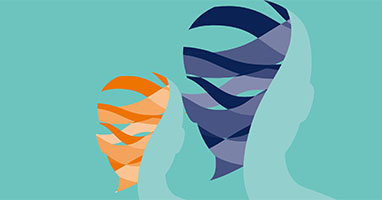Better sleep
Did you know that around 1 in 5 people in the UK are not getting the required amount of sleep?
Hybrid working has the potential to drastically impact sleep patterns. You may have found that you have slipped into bad habits, such as binge-watching TV series or spending more time on social media immediately before bed. This shift may have also affected eating tendencies, such as eating later or having larger meals, and possibly drinking more alcohol or caffeine. As a result, you may have found it more difficult to drift off at night and in turn struggle to get up in the morning.
Sleep is essential for health, and is the body’s opportunity to restore, rejuvenate and repair, but a good night’s sleep can be harder for some to achieve than for others. Stress, excessive screen-time, noise disruption or a diagnosable sleep disorder can all lead to a lack of sleep, which can be hugely detrimental to our health, so we should strive to get as much good-quality sleep as possible.
The optimal amount of sleep required can vary from person to person; school age children need around 10 hours of sleep, while adults need an average of 7 to 9 hours a night. As you get older, less sleep is generally required, so there’s no need to worry if you become more of a light sleeper.
Effects of poor sleep
You are probably already aware of the immediate effects a poor night’s sleep can have, but regular, insufficient and poor-quality sleep can have long-term effects on many aspects of our physical and mental health. According to the NHS, studies have shown that a lack of sleep can make it harder to think clearly, impact memory recall, weaken the immune system, lead to weight gain and cause an increased risk of high blood pressure, heart disease and diabetes. Research has also shown that a poor night’s sleep can reduce our ability to manage our emotions, impact impulse control, reduce positive thinking, increase worry and lead to or worsen depression.
How to get a better night’s sleep
Negative thoughts, lack of routine, an unsuitable bedroom environment and inactivity during the day can all have an impact on your sleep. The World Sleep Society recommends various steps you can take to help you get a better night’s sleep, and we have produced this infographic with some of the top tips 'How to get a better night's sleep'
For information on sleep, such as the signs and symptoms of poor sleep plus some self-help interventions on managing it then this self-help guide may be useful.
Insomnia is a common sleep problem
It is not uncommon to have problems sleeping at one time or another in your life, and if you suffer from insomnia it can have a significant impact on your wellbeing. It is thought that one in three people are affected by insomnia, particularly the elderly.
The following may be signs of insomnia:
- Difficulty falling asleep, sometimes taking hours to fall asleep
- Waking up several times during the night and having difficulty getting back to sleep again
- Waking up early in the morning and not being able to get to sleep again
- Not feeling refreshed when getting up in the morning
- Feeling tired and irritable during the day and having difficulty concentrating due to difficulty with sleep.
A number of factors can prevent us from sleeping:
Stress and anxiety
A stressful event can be the catalyst for insomnia and sleep problems can persist even after the stressful event has been resolved. Worries about work, money, health, death or illness or a loved one can trigger insomnia.
Psychiatric problems
Mental health problems such as depression or bipolar disorder, anxiety, post-traumatic stress and psychotic disorders, such as schizophrenia affect our sleep.
Physical conditions
Many physical conditions, such as heart problems, asthma, Alzheimer's or Parkinson's disease, hormonal problems, irritable bowel syndrome and general physical pain can cause insomnia.
Medication
Some medication, both prescribed and over-the-counter can cause insomnia, such as antidepressants, epilepsy drugs, high blood pressure medication or steroid medication.
Any long-term sleep problems may require a visit to your GP to diagnose and treat any underlying health problems. Your GP may advise on lifestyle changes you could make, they may prescribe sleeping tablets or refer you for cognitive behavioural therapy.
Resources to support better sleep
- Self-Help CBT Workbooks (EAP)
- NHS Every Mind Matters - Having sleep problems, there are simple steps you can take
- Mind - How to cope with sleep problems
- The Sleep Charity - Advice and tips on how to improve sleep quality
- The Mental Health Foundation - Sleep well: your pocket guide to better sleep
Employee Assistance Programme (EAP)
Staff can use the Vivup EAP service to speak to a trained counsellor 24/7, 365 days a year. To access the support line, call 0330 380 0658 and mention you are LJMU staff or visit the website.


